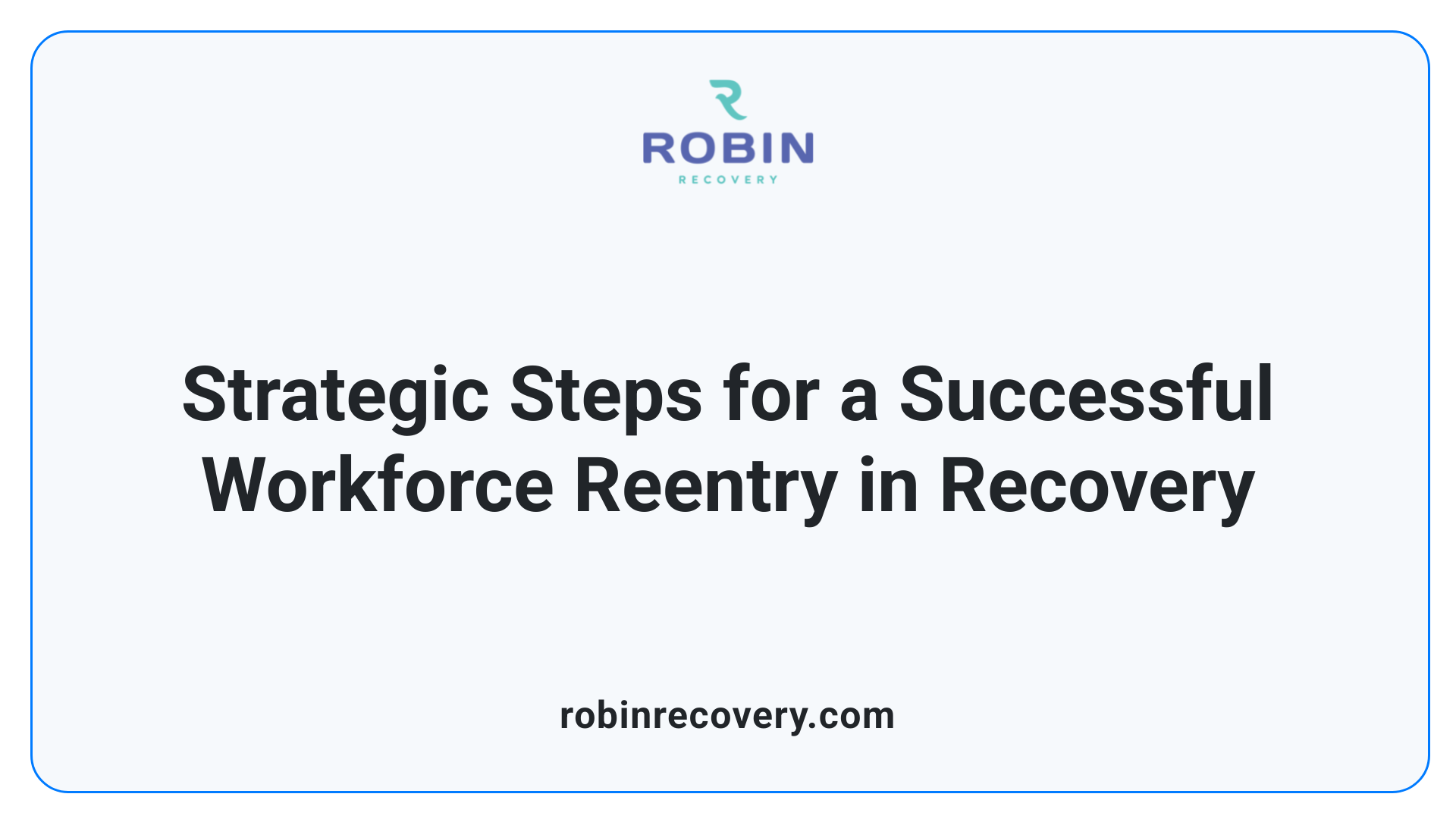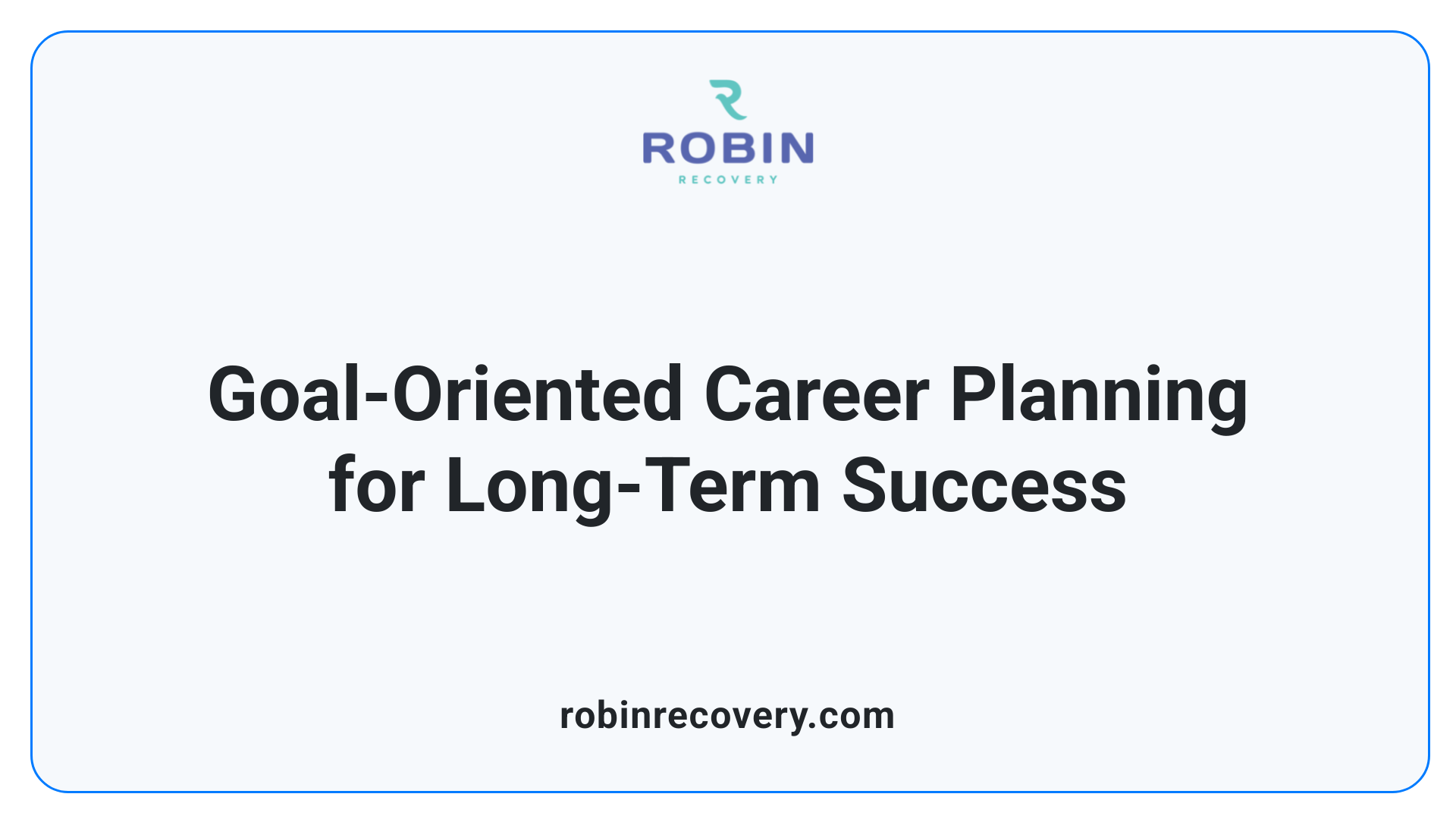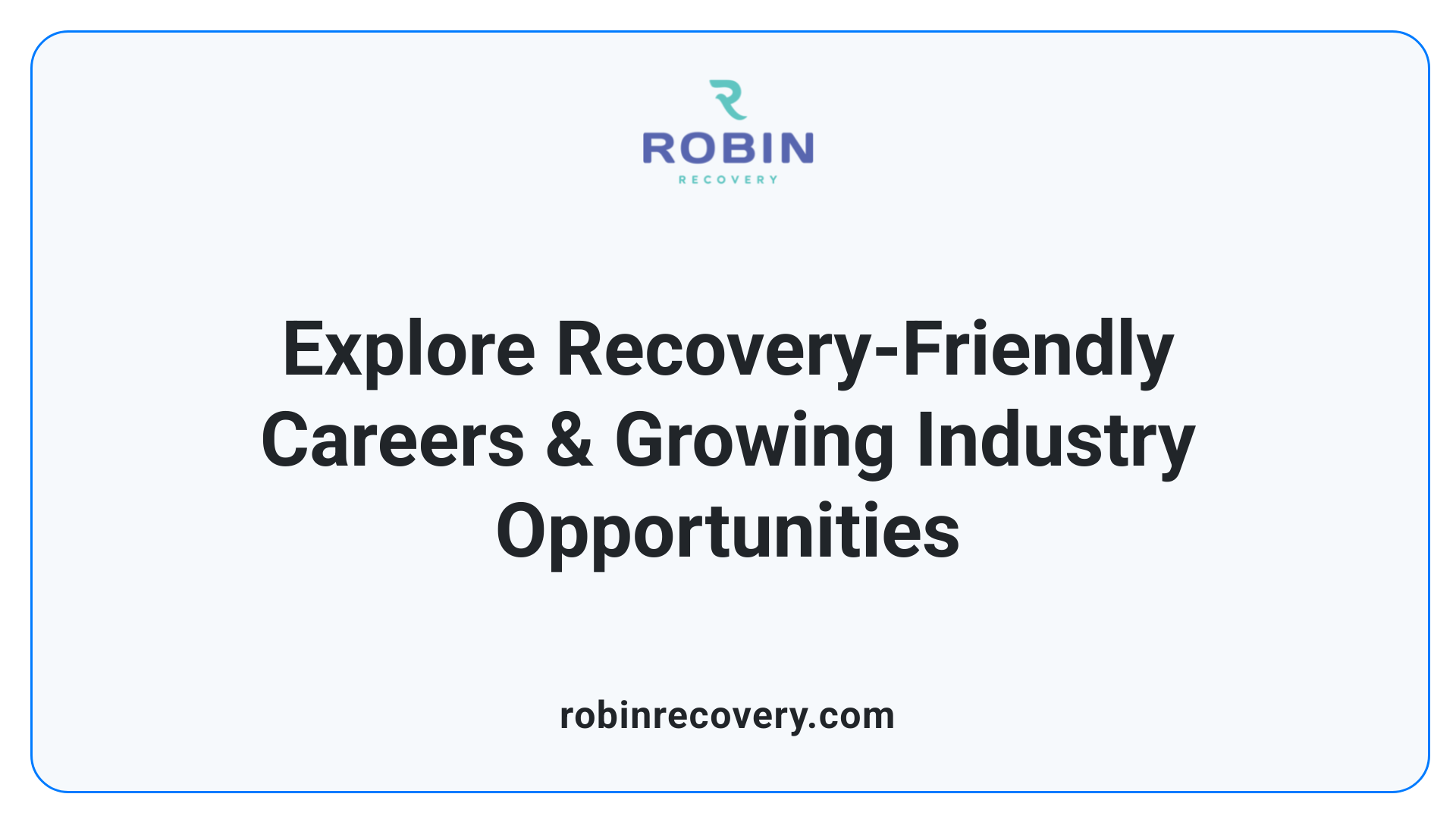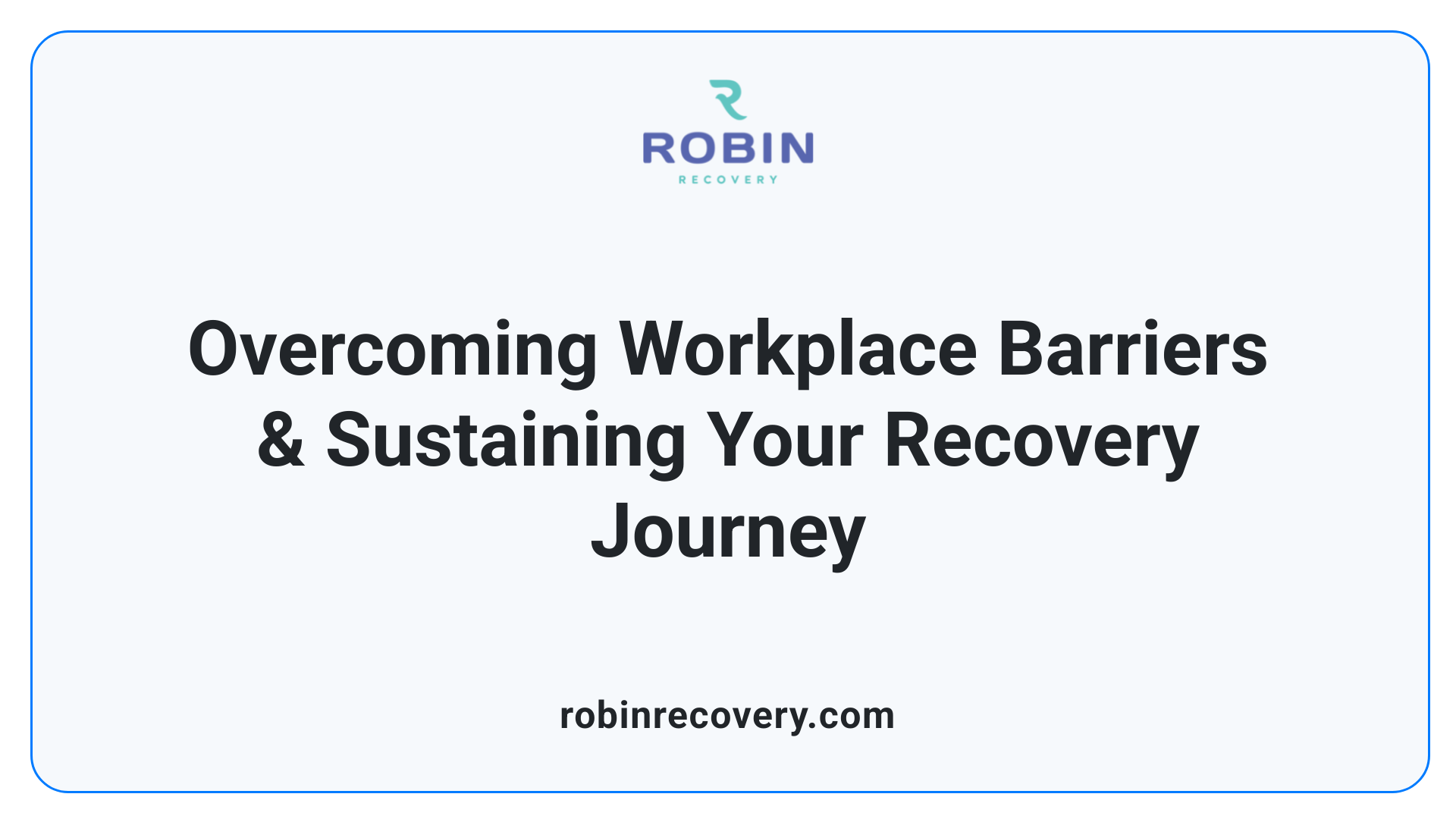How to explore career opportunities after addiction recovery

Unlocking New Opportunities After Addiction Recovery
Recovery from addiction opens the door to personal transformation and fresh career opportunities. While reentering the workforce can present challenges such as managing employment gaps and overcoming stigma, numerous resources and strategies exist to facilitate a successful transition. This article explores how individuals can explore, plan, and rebuild their careers, leveraging support networks, legal protections, and targeted industry opportunities to foster sustainable employment and personal fulfillment.
Leveraging Resources and Support Networks for Career Development
What are some guidance and resources for career development during or after addiction recovery?
Recovering individuals often face unique challenges when re-entering the workforce, but numerous resources are available to facilitate this transition. Organizations like Recovery Career Services provide personalized coaching, resume workshops, and online courses tailored to help individuals rebuild their careers and regain confidence.
Government initiatives such as Career One Stop and Massachusetts' Access to Recovery program offer vital tools—including self-assessment questionnaires, job training programs, and resume writing support. These resources help individuals clarify career goals, develop necessary skills, and connect with potential employers.
Legal frameworks like the Americans with Disabilities Act (ADA) also play a crucial role in protecting recovering addicts from workplace discrimination. Guidance on how to navigate disclosures and legal rights ensures individuals can seek employment without fear of unjust treatment.
Support from employers and community organizations is fundamental. Many workplaces now partner with treatment providers to create supportive, inclusive environments. The use of models like Individual Placement and Support (IPS) fosters ongoing employment opportunities.
Additionally, professional networks such as NAADAC (National Association for Alcoholism and Drug Abuse Counselors) and ASAM (American Society of Addiction Medicine) offer certification programs and continuing education, which can boost careers within the addiction recovery field. As demand in this sector grows, gaining relevant credentials can enhance job prospects and open doors to leadership roles or specialized positions.
Combining these resources with a clear understanding of personal strengths and goals empowers recovering individuals to navigate career development confidently, securing stability and purpose upon re-entry into the workforce.
Reentering the Workforce: Strategies for Success

How can individuals in recovery reenter the workforce and rebuild their careers?
Reentering the workforce after overcoming addiction involves a thoughtful approach centered on self-assessment and strategic planning. First, individuals should evaluate their current skills, interests, and career goals. This reflection helps identify what kind of work aligns with their passions and strengths. If necessary, pursuing additional certifications or further education can enhance employability and open doors to new opportunities.
Building a robust support network is crucial during this transition. Engaging with recovery groups, such as Alcoholics Anonymous (AA) or Narcotics Anonymous (NA), provides emotional support and motivation. Connecting with family, friends, mentors, and community programs like Recovery Career Services offers guidance and encouragement. These relationships can lead to job referrals, mentorship, and ongoing accountability.
Maintaining stability in recovery is fundamental for career success. Developing healthy lifestyle habits—such as regular exercise, balanced nutrition, adequate sleep, and mindfulness practices—supports mental and physical well-being. Ongoing therapy or counseling helps manage stress and prevents triggers that could jeopardize sobriety and employment.
Exploring employment options that offer supportive environments and recognition of the value of recovery can significantly improve chances of success. Many organizations promote inclusive workplaces and actively seek to hire individuals in recovery. Programs like America in Recovery and the National Hire Network connect job seekers with employers committed to diversity and inclusion.
It's also beneficial to consider flexible or entry-level positions initially. These roles provide opportunities to rebuild confidence, develop new skills, and demonstrate commitment. Volunteering can be another pathway, allowing individuals to gain experience and establish work routines without immediate pressure.
Setting clear, manageable goals creates a sense of purpose and direction. Whether focusing on career growth, skill development, or work-life balance, goal setting helps maintain motivation. Regularly reassessing these goals ensures alignment with evolving recovery and professional aspirations.
Ultimately, persistence combined with strategic planning, strong support, and a focus on health and stability enables individuals in recovery to successfully reenter the workforce, rebuild their careers, and achieve long-term fulfillment.
Effective Career Planning and Goal Setting

What are some strategies for career planning and setting goals after overcoming addiction?
Navigating a career path following addiction recovery requires deliberate planning and realistic goal setting. One of the first steps is to establish clear, attainable objectives that align with your personal values and recovery journey. This might mean focusing on roles that offer stability, growth opportunities, or a supportive work environment.
Updating your resume is crucial. Highlight recent work experience, newly acquired skills, relevant education, and certifications. If there are employment gaps due to recovery, consider addressing them honestly or framing them positively, emphasizing the skills learned during that period.
Building a solid support network is vital. Connecting with recovery groups, mentors, and professional contacts can provide motivation, mentorship, and potential job opportunities. Networking through community organizations or industry events often leads to referrals and a sense of belonging.
Research industries and companies that are known to foster recovery-friendly workplaces. Organizations with inclusive policies, flexible working hours, and understanding management create an environment conducive to sustaining employment.
Other effective strategies include exploring career counseling through services like Recovery Career Services or Career One Stop, participating in job training or educational programs to build new skills, and being open to entry-level or volunteer positions initially. These approaches help rebuild confidence and demonstrate your commitment to long-term employment.
Maintaining honesty about your recovery when appropriate can foster employer understanding and support. Awareness of your legal rights under the Americans with Disabilities Act (ADA) is important. Overall, a balanced approach that focuses on self-care, skill development, and professional growth positions you for sustainable success.
To encapsulate, effective career planning post-addiction involves setting realistic goals, showcasing your skills confidently, leveraging support systems, and seeking work environments that value employee well-being. These steps contribute to a resilient career foundation, supporting continued recovery and personal fulfillment.
Identifying Suitable Jobs and Industry Opportunities

What types of jobs are suitable for individuals in recovery from addiction?
When choosing a career path after recovery, it is important to consider roles that align with personal skills, interests, and the need for a supportive work environment. Many recovering individuals find fulfillment in careers within the recovery and social services sectors. Positions such as addiction counselors, peer support specialists, and recovery coaches not only utilize their lived experiences but also play a crucial role in helping others, reinforcing their own sobriety.
Vocational trades are also practical options for those seeking less extensive training. Careers as electricians, HVAC technicians, dental hygienists, or skilled trades generally require certification or a two-year degree but can lead to stable employment and financial independence.
Creative and health-oriented jobs provide opportunities for expression and wellness. Artists, art therapists, personal trainers, yoga instructors, or outdoor educators can offer therapeutic benefits and flexible schedules, aiding in maintaining a balanced recovery.
A vital aspect of successful employment during recovery is working in environments that promote understanding and accommodate individual needs. Supportive workplaces with recovery-friendly initiatives, such as second-chance hiring policies and employee assistance programs, foster stability and growth. These environments not only provide a safe space for those in recovery but also enhance career longevity.
Industries that tend to welcome recovering individuals
Certain fields show a greater propensity for inclusive hiring practices and supportive work cultures, making them attractive options for those rebuilding their careers. These industries include:
Industry Opportunities Description Health and Wellness Therapists, fitness trainers, health educators Focus on health, recovery, and holistic well-being. Social Services Counselors, social workers, outreach coordinators Directly involved in community support and recovery programs. Non-Profit Organizations Program managers, grant writers, peer advocates Often mission-driven, welcoming diversity and rehabilitation. Creative Industries Artists, writers, performers Promote self-expression and community engagement. Outdoor and Nature-based Jobs Environmental educators, park rangers Emphasize activity, outdoor work, and stress reduction.
These sectors not only provide meaningful work but also tend to be more understanding of the challenges faced by those in recovery.
Supporting job prospects through training and community resources
Investing in vocational training or certification programs enhances employability. Many community colleges and organizations offer low-cost or free training tailored for returning workers. Additionally, connecting with organizations like America in Recovery, the National Hire Network, or local recovery centers can open doors to job referrals, mentorship, and placement services.
Networking remains a powerful tool. Attending recovery support groups, industry meetups, or job fairs focused on inclusion can help individuals build connections and discover job opportunities.
Navigating employment with recovery in mind
Applying for jobs with an honest but strategic approach can foster understanding and support. Candidates should tailor resumes to highlight skills such as emotional intelligence, resilience, decision-making, and technical expertise. Employers with strong diversity policies are legally restricted from inquiring about past substance use, especially under the Americans with Disabilities Act (ADA).
Working part-time or with flexible hours can also ease the transition back into employment. The goal is to find roles that support ongoing recovery efforts while providing financial stability and personal growth.
In summary, choosing the right job involves assessing personal strengths, exploring industries committed to inclusivity, utilizing community resources, and maintaining transparent communication about recovery. These steps ensure a sustainable and rewarding career for individuals post-rehabilitation, contributing to their long-term sobriety and well-being.
Legal Rights, Protections, and Support Measures
What legal rights and support options are available for recovering addicts seeking employment?
Individuals in recovery from substance use disorders have specific legal protections and support options when seeking employment. A primary safeguard is provided by the Americans with Disabilities Act (ADA), which makes it illegal for employers to discriminate against those who are in recovery, so long as they are no longer engaged in illegal drug use. This means that recovering addicts who are sober and have successfully completed part of their treatment are protected when applying for jobs.
Employers are encouraged to offer accommodations that can help employees sustain their recovery and perform their duties effectively. These accommodations may include flexible work hours, schedule adjustments for treatment appointments, or access to supportive workplace policies and employee assistance programs. Such measures promote a more inclusive, understanding work environment that supports long-term sobriety.
Medications prescribed as part of addiction treatment, such as methadone or Suboxone, are generally recognized within legal frameworks and do not impair employment rights. These medications help individuals maintain sobriety, and their use is protected under law, meaning workers can request reasonable adjustments without fear of discrimination.
In addition to federal protections, many states extend extra safeguards and support programs for individuals returning to work after recovery. These state-specific measures may include dedicated job placement services, vocational training, or reintegration programs tailored to recovering addicts.
It’s also beneficial for individuals in recovery to understand their rights concerning the disclosure of their past addiction — whether to share such information is voluntary or when prompted during background checks. Knowing the legal landscape can empower recovering workers to advocate for themselves and seek workplaces known for their recovery-friendly policies.
Legal protections, combined with supportive employer policies and available state programs, create a framework that helps recovering individuals navigate the workforce confidently, reducing the risk of discrimination and promoting sustainable employment.
Aspect Description Additional Notes ADA Protections Prevents discrimination against former substance users Only applies if no current illegal drug use occurs Accommodations Flexible hours, leave for treatment, supportive policies Employers encouraged to adjust work conditions Medication Use Medications like methadone/Suboxone are recognized legally Does not impair employment rights State Support Programs Local initiatives for reintegration and job placement Vary by state, include training and assistance Disclosure Rights Workers can choose whether to disclose recovery status Know your rights for best workplace practices
This legal framework is designed to support recovery and employment stability. Knowing your rights and available support measures can facilitate a successful work-life balance, fostering both personal growth and contribution to the community.
Building Skills and Education Post-Recovery

How can recovering individuals develop new career skills or meet educational requirements post-recovery?
For individuals in recovery, strengthening career prospects often starts with gaining relevant skills and education. Many find success by enrolling in vocational training programs, community college courses, or online classes tailored to specific industries. These educational pathways help develop practical skills that are crucial for employment and career advancement.
Engagement in internships, apprenticeships, or volunteer work provides valuable hands-on experience. These opportunities not only enhance skills but also facilitate networking within the industry, making it easier to find permanent employment.
Pursuing higher education is another avenue. Degrees such as a bachelor's or master's in fields like social work, counseling, or health sciences can lead to roles in addiction treatment and support services. Certification programs are also essential for specialized professions, such as addiction counselors or recovery coaches.
To comply with professional standards, individuals should research specific licensure and certification requirements early. Meeting these standards is vital for independent practice and moving into higher-level roles in the rehabilitation and health sector.
In addition to formal education, many organizations and community programs offer supported pathways for learning. These include scholarships, grants, and tailored training programs designed for those rebuilding their lives after addiction.
By actively pursuing education and skill-building, individuals in recovery can set a solid foundation for a sustainable and fulfilling career, contributing not only to their own well-being but also to their communities.
Step Action Additional Details 1 Enroll in vocational or online courses Accessible, flexible learning options for skill development 2 Seek internships or volunteer work Practical experience and industry connection 3 Pursue higher education Degrees or advanced certifications aligned with career goals 4 Ensure compliance with licensing Meeting state and professional certification requirements
Leveraging these educational strategies can significantly improve career prospects and stability for recovering individuals.
Overcoming Challenges and Sustaining Long-Term Success

What challenges might individuals face when transitioning back to work after addiction recovery, and how can they be supported?
Returning to a job following addiction treatment is a critical step that can offer stability, purpose, and improved mental health. However, this transition often presents numerous hurdles. Many recovering individuals grapple with workplace stigma, which can stem from misconceptions or prejudices about addiction and recovery. They may also experience anxiety related to handling stress, maintaining sobriety amid workplace pressures, or rebuilding trust with colleagues and supervisors.
Support mechanisms play a vital role in easing this transition. Counseling services, including mental health therapy and coaching, help individuals develop coping strategies for workplace stress and reinforce their commitment to sobriety. Peer support groups, such as those offered by organizations like Alcoholics Anonymous (AA) and Narcotics Anonymous (NA), provide community backing and shared experiences that foster resilience.
Workplace accommodations also contribute significantly to successful reentry. Employers dedicated to supporting recovery create an inclusive environment by offering flexible schedules, sober-friendly policies, and access to Employee Assistance Programs (EAPs). Legal protections under the Americans with Disabilities Act (ADA) prohibit discrimination based on recovery status, and transparent communication can promote understanding.
Several specialized programs enhance employment success for people in recovery. The Individual Placement and Support (IPS) model focuses on placing individuals into meaningful jobs aligned with their interests, fostering engagement and stability. Additionally, initiatives like second-chance hiring policies encourage employers to give individuals with criminal records or past substance issues a fair shot.
Organizations such as Headwaters and Recovery Career Services provide tailored coaching, career workshops, and ongoing support that address employment barriers. These programs aim to match skills with suitable roles, assist with resume building, and prepare candidates for interviews.
Building and maintaining a robust support network is essential. Attending support group meetings, engaging with recovery mentors, and leveraging community resources contribute to long-term employment success. Besides professional support, adopting healthy habits—such as regular exercise, mindfulness practices, setting clear boundaries, and pursuing ongoing therapy—strengthen resilience.
For some individuals, exploring new career paths or shifting responsibilities—like transitioning into health, wellness, or community service sectors—may better align with their recovery journey.
In conclusion, overcoming workplace challenges requires a multifaceted approach. Combining emotional support, legal protections, tailored employment strategies, and healthy lifestyle choices empowers individuals to sustain their recovery while thriving professionally.
Fostering a Supportive Environment for Career Growth
Rebuilding a career after addiction recovery is a journey that requires resilience, patience, and strategic planning. Leveraging available resources, understanding legal protections, and engaging with supportive employers can significantly ease the transition back into the workforce. Careers in addiction treatment, social services, and wellness industries offer meaningful opportunities for those passionate about making a difference while reinforcing their own sobriety. Creating a recovery-friendly work environment, nurturing a strong support network, and continuing personal development are pivotal for long-term success. Ultimately, overcoming challenges and embracing new opportunities can lead to fulfilling, stable careers that enrich both personal and community well-being.
References
- How To Find Your First Job After Rehab - Addiction Center
- Finding a Job After Rehab - Addiction Recovery Employment Guide
- Employment Guide for Recovering Addicts & Alcoholics
- Employment Resources for People Recovering From Substance ...
- Regain Your Career After Addiction - Headwaters
- Finding a New Job After Rehab & Counseling - The Solida Foundation
- Good Jobs For Recovering Addicts - Crestview Recovery Center
- 7+ Tips on How to Find a Job After Rehab - Novoresume
- 5 Careers in Addiction Recovery For People Who Want to Save Lives
